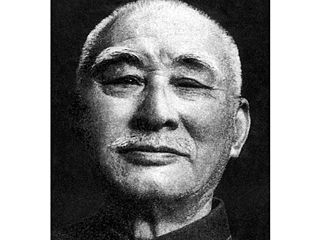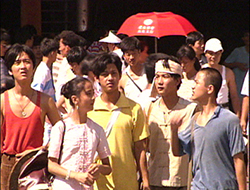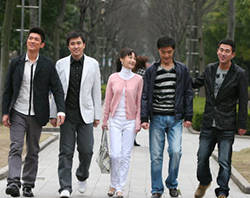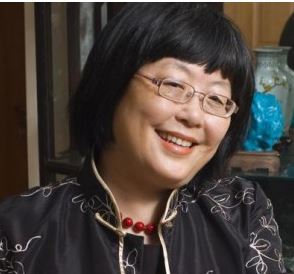
Eileen Chang (traditional Chinese: 張愛玲; simplified Chinese: 张爱玲; pinyin: Zhāng Àilíng; Wade–Giles: Chang1 Ai4-ling2;September 30, 1920 – September 8, 1995), also known as Chang Ai-ling or Zhang Ailing, or by her pen name Liang Jing (梁京), was a Chinese-born American essayist, novelist, and screenwriter. She is a well-known feminist in Chinese history, known for portraying life in the 1940s Shanghai and Hong Kong.
Bai Hua was a Chinese novelist, playwright and poet. He gained national fame for his plays based on uncompromising historical criticism.

Xin Qiji was a Chinese calligrapher, military general, and poet during the Southern Song dynasty (1127–1279).

Ye Shengtao was a Chinese writer, journalist, educator, publisher and politician. He was a founder of the Association for Literary Studies (文學研究會), the first literature association during the May Fourth Movement in China. He served as the Vice-Minister of Culture of the People's Republic of China.
Wang Anyi is a Chinese writer, vice-chair of the China Writers Association since 2006, and professor in Chinese Literature at Fudan University since 2004.
The sent-down, rusticated, or "educated" youth, also known as the zhiqing, were the young people who—beginning in the 1950s until the end of the Cultural Revolution, willingly or under coercion—left the urban districts of the People's Republic of China to live and work in rural areas as part of the "Up to the Mountains and Down to the Countryside Movement".
Chinese science fiction is genre of literature that concerns itself with hypothetical future social and technological developments in the Sinosphere.
Jack Kao is a Taiwanese actor.

The Legend of the Condor Heroes is a 2008 Chinese television series adapted from Louis Cha's novel of the same title. The series was produced by Chinese Entertainment Shanghai, and stars Hu Ge, Ariel Lin, Justin Yuan and Cecilia Liu. The series was first broadcast on KMTV-1 in China in July 2008.
Zhu Lin, born as Wang Zuling, is a Chinese novelist.
Gods and demons fiction is a subgenre of fantasy fiction that revolves around the deities, immortals, and monsters of Chinese mythology. The term shenmo xiaoshuo, coined in the early 20th century by the writer and literary historian Lu Xun, literally means "fiction of gods and demons". Works of shenmo fiction include the novels Journey to the West and Investiture of the Gods.

Chen Xuezhao was a Chinese writer and journalist. She was earlier known as Chen Shuzhang or Chen Shuying. She used the pen names Ye Qu, Shi Wei, Xue Zhao and Hui. She was one of the most prolific Chinese women writers of the 20th century. Chen gave her support to Mao Zedong's policy on Art and Literature.

Sinful Debt is a 1995 Chinese television drama directed by Huang Shuqin and produced by Shanghai Television. It was written by Ye Xin, based on his 1992 novel Educated Youth. The series follows five innocent-eyed teens who travel more than 2000 km from remote Xishuangbanna Dai Autonomous Prefecture to Shanghai searching for their unacquainted parents — former sent-down youths who in order to return home abandoned them in the countryside. They teens did not expect, however, that their unannounced arrivals would create myriads of economic and relational problems for their urban parents, many of whom already remarried with new families.
Wu Jing is a Chinese actress. She starred in many films in the 1980s and 1990s. She is also known for her roles in many popular TV series, like Sinful Debt (1995) and The Story of a Noble Family (2003).

Sinful Debt 2 is a 2010 Chinese television drama and the sequel of the 1995 hit series Sinful Debt. Again created by novelist Ye Xin, the story follows the same 5 children of sent-down youths—no longer teens but young adults nearing 30, as they establish careers and relationships in a post-modern world. Close to a dozen veteran actors repeated their memorable roles, but the 5 main characters were all portrayed by new actors.
Ye Xin is a Chinese writer who has written profusely about "sent-down youths", drawing from his own experience. A Shanghai native, Ye Xin "volunteered" to receive his "rustication" in remote Guizhou in 1969, where he spent 2 decades of his life. He has written over 20 novels, but is best known for writing the teleplay of mega-hit series Sinful Debt (1995), based on his 1992 novel Educated Youth.

Cheng Naishan was a writer from China who came from an upper-class background, had lived in Hong Kong, was trained in the English language, and was a Christian. Unlike her contemporaries, she taught English and later wrote in English. One of the most well-known of the Shanghai School (haipai) writing style, Cheng revived the literary legacy of the elites who had been rejected during the Cultural Revolution. She won numerous awards for her novels and short stories before embarking on a series of non-fiction works telling the history of "Old Shanghai".
Qin Wenjun is an author of children's literature. She writes in Chinese.
Chen Cun (陈村), pseudonym of Yang Yihua (杨遗华), is a Hui Chinese novelist known for his stories about the zhiqing experience during the Cultural Revolution. He is also one of the pioneers of electronic literature in China.








